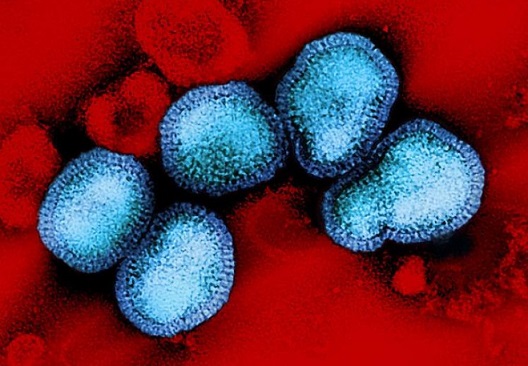Nikhil Prasad Fact checked by:Thailand Medical News Team May 08, 2025 9 months, 3 weeks, 3 days, 22 hours, 2 minutes ago
Medical News: Scientists Discover Key Role of KRT6A in Halting Influenza A Virus Replication
A groundbreaking study led by researchers from the State Key Laboratory for Animal Disease Control and Prevention at Harbin Veterinary Research Institute under the Chinese Academy of Agricultural Sciences, in collaboration with the Technology Center of Qingdao in China, has revealed an exciting new role for the human protein KRT6A in fighting influenza A virus (IAV). This
Medical News report uncovers how KRT6A acts as a powerful natural blocker of the virus inside human cells, offering potential leads for future antiviral therapies.
 Keratin Protein KRT6A Offers New Hope in Blocking Influenza A Virus
Keratin Protein KRT6A Offers New Hope in Blocking Influenza A Virus
Influenza A virus continues to pose a serious global health threat with its ability to jump from animals to humans and trigger severe respiratory illnesses. Current antiviral drugs face the constant challenge of resistance and limited effectiveness. The study shines a spotlight on KRT6A, a structural protein usually found in the skin and epithelial tissues, and now identified as a surprising defender against flu virus replication.
Blocking the Virus at Its Core Replication Site
Influenza A virus depends on a group of proteins known as the viral ribonucleoprotein (vRNP) complex to replicate its genetic material once inside a host cell. This complex needs to enter the cell nucleus to carry out its job. The research team found that KRT6A can effectively block this process. By interfering with the nuclear import of vRNP complexes and a key viral protein called NP, KRT6A essentially prevents the virus from multiplying.
In lab experiments using human lung cells, researchers demonstrated that reducing KRT6A levels with RNA-based methods led to a significant increase in virus production. Conversely, when KRT6A was overproduced in the same cells, the virus struggled to replicate, showing up to 17-fold lower virus levels. These findings were validated by measuring viral protein levels and performing virus plaque assays.
A Molecular Roadblock to Viral Entry
Further investigation revealed that KRT6A directly binds to all four major proteins that make up the influenza vRNP complex—PB1, PB2, PA, and NP. Interestingly, while this interaction does not interfere with the nuclear transport of PB1, PB2, or PA, it does stop NP from connecting with a specific host transport protein called importin α3. This disrupted interaction blocks NP’s entry into the cell nucleus and prevents the assembly of new vRNP complexes, severely limiting viral reproduction.
Through confocal microscopy and fractionation studies, researchers showed that in the presence of KRT6A, viral proteins remained stuck in the cytoplasm and failed to reach the nucleus. This nuclear blockade, alongside hindered vRNP assembly, presents a double blow to the virus.
Why This Matters for Future Flu Treatments
This discovery positions KRT6A as a natural antiviral factor within human cells and opens a new avenue for develop
ing therapies that enhance or mimic its effects. Since the protein is already present in our body, future drugs could focus on boosting KRT6A’s activity or designing molecules that copy its ability to disrupt the virus’s replication process. Unlike traditional antiviral medications that target the virus directly, this host-based strategy might reduce the risk of resistance development.
The study also highlights how human cells have their own built-in antiviral strategies, many of which are only now being discovered. By understanding and harnessing these natural defenses, science may be able to stay one step ahead of mutating viruses like influenza.
Conclusion
This important study adds to our growing understanding of how host proteins can naturally fight off viral infections. By revealing that KRT6A blocks influenza A virus by halting its entry into the cell nucleus and disrupting viral complex formation, researchers have identified a promising new target for flu treatment. This breakthrough could pave the way for novel antiviral drugs that support or replicate KRT6A’s protective role. As influenza viruses continue to evolve and threaten global health, such discoveries are crucial in the search for safer, more effective solutions.
The study findings were published in the peer reviewed journal: Viruses.
https://www.mdpi.com/1999-4915/17/5/671
For the latest Influenza News, keep on logging to Thailand
Medical News.
Read Also:
https://www.thailandmedical.news/news/the-phytochemical-carnosol-found-in-rosemary-destroys-influenza-a-virus-and-reduces-lung-inflammation
https://www.thailandmedical.news/news/beta-glucans-found-in-mushrooms-can-reprogram-neutrophils-to-combat-influenza-a-viruses
https://www.thailandmedical.news/news/selenium-strengthens-immunity-and-helps-fight-viral-diseases-including-covid-19-and-influenza
https://www.thailandmedical.news/articles/influenza-or-flu
https://www.thailandmedical.news/pages/thailand_doctors_listings
